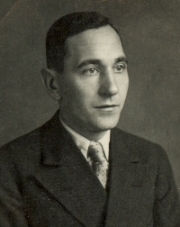Search for Names, Places and Biographies
Already layed Stumbling Stones
Suche
Otto Lang * 1908
Am Gleise 8 (Hamburg-Mitte, Veddel)
Inhaftiert 1935 KZ Börgermoor
Strafbataillon 999, Tot 06.05.1945
Otto Lang, born 30 Jan. 1908 in Hamburg,
imprisoned 1935 in the Börgermoor Concentration Camp, assigned to the 999th Light Afrika Division, died 6 May 1945, Kos, Greece
Am Gleise 8, Veddel
Otto Lang was from a family of Social Democrats, and joined the Socialist Workers Youth Organization at a young age. On 8 October 1924 he joined the Hamburg youth group of the Reichsbanner Schwarz-Rot-Gold (Black, Red, and Gold Banner of the Reich, a liberal, patriotic organization during the Weimar Republic). In the following years he was active in the Rothenburgsort chapter of the SPD (Social Democratic Party of Germany).
Since the end of the 1920s, much of the party’s work in Rothenburgsort had been concerned with the conflict between the National Socialists and the Communists. The group centered around Fritz von Hacht, Helmuth Weidt, Franz Wendt, and Otto Lang read Nazi publications like Hitler’s Mein Kampf and published pamphlets warning of the impending dangers of the "brown (Nazi) terror.” Violent confrontations were nearly a daily occurrence.
Unemployed himself, Otto Lang became involved with the Larger Hamburg Self-help Group for the Unemployed in the early 1930s. Even after the self-help group came under Nazi control in 1933, it continued to be a meeting point for members of the SPD, which had been banned the same year.
With his compatriots, Otto Lang continued to be politically active underground. They met regularly, but in changing locations for security reasons, to discuss the political situation, design pamphlets, and organize their distribution. The group was in contact with other Social Democratic resistance organizations in Hamburg and the surrounding regions. A large part of the published resistance material was smuggled into the country from Denmark, where Social Democrats who had fled Germany attempted to encourage and coordinate the resistance activities of the individual groups.
A denunciation led to the group’s discovery on 5 February 1935. Fritz von Hacht, Helmut Weidt, Franz Wendt, and Otto Lang were arrested and sent to the Fuhlsbüttel Concentration Camp. After he was arrested, the Gestapo searched Lang’s apartment for prohibited SPD publications. Much to his wife’s relief, they didn’t find the printing machine with which many of the pamphlets had been created. It was fastened to the underside of the coffee table in the living room.
After the Gestapo’s exhaustive investigation on suspicion of "having maintained the organizational solidarity of the SPD,” Otto Lang was released on 30 April 1935. The court sentenced the other three resistance fighters to prison sentences. The Gestapo again arrested Otto Lang on 16 October 1935. Another Social Democratic resistance group had been discovered, and Otto Lang’s name was mentioned. He and six other defendants – to whom Otto Lang had no connection – were accused of violating the ban on the SPD by "distributing treasonous publications.” During the trial, Otto Lang admitted to having given Franz Wendt about 25 to 30 copies of the Social Democratic newspaper Sozialistische Aktion.
On 19 December 1935, the Hanseatic Higher Regional Court found Otto Lang guilty of intent to commit high treason and sentenced him to two-and-a-half years in prison and the loss of his rights as a citizen. Lang was sent to the Börgermoor/Ems Concentration Camp. He was released on 19 January 1938, after signing an agreement not to discuss the prison conditions in Börgermoor.
While Otto Lang was serving his sentence, his wife, Senta Lang, received no financial support from the state for herself and her daughter Helga. Their health insurance also remained unpaid, so that she had to cover any medical bills from her own pocket. The authorities suggested that she divorce her husband in order to improve her situation. Senta Lang earned what income she could as a laundress and cleaning lady. She was under Gestapo observation and had to report to the police once a week. Anyone who visited the family was openly shadowed by the Gestapo.
After Otto Lang was released from prison, he worked from 1938 to 1942 as a technician for the International Harvester Company, which produced agricultural machines in Hamburg. Many opponents of the regime found work here. On 3 December 1942, the Wehrmacht conscripted Otto Lang and assigned him to the 999th Light Afrika Division, a penal military unit. In 1943 the division was deployed to the Greek island of Kos. Shortly before the end of the war, Otto Lang drowned when he and a comrade attempted to flee the island on a raft.
Translator: Amy Lee
Kindly supported by the Hermann Reemtsma Stiftung, Hamburg.
http://verfolgte.spd-hamburg.de/form.php
Stand: March 2017
© Christel Oldenburg
Quelle: Privatarchiv Helga Roepert
(Prozessakten, Familienunterlagen u.a.),
Interview Helga Roepert am 7.Juni 2001


